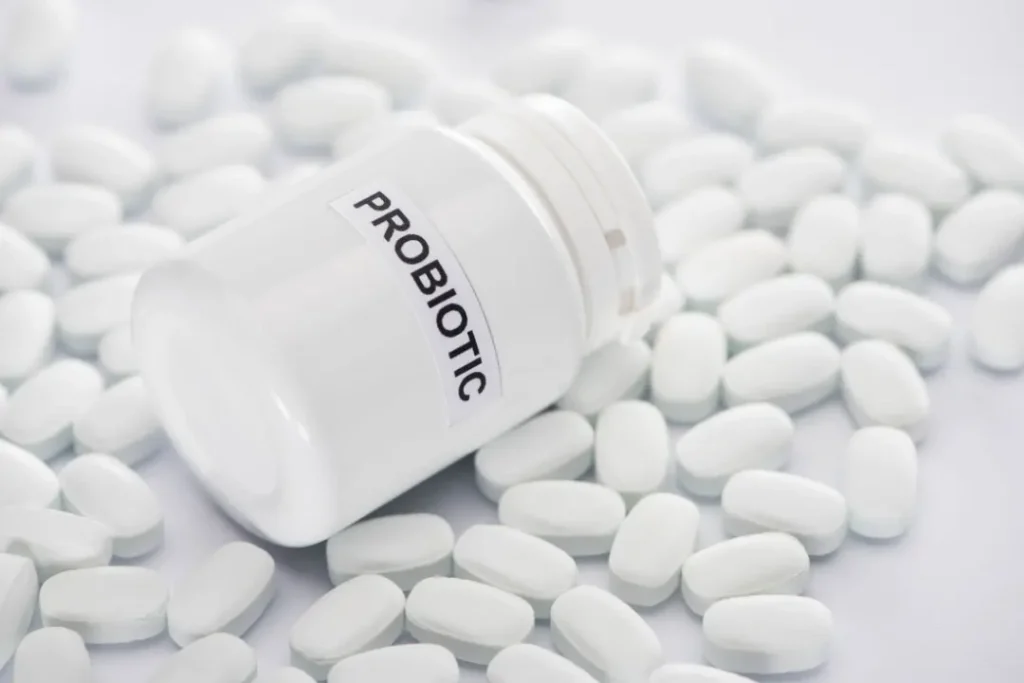A healthy gut microbiome supports overall health across multiple body systems, and the market offers a range of supplements promising to restore balance in the gut. We’ll compare two leading brands: Nu Biome gut health and Medicine Man Plant Co.’s The Gut Pill, so that you can make a better-informed purchase decision.
From stomach bugs to the common cold and more severe illnesses, our world is teeming with a wide array of bacteria, viruses, and fungi that are invisible to the naked eye. Although the term ‘bacteria’ may have you wanting to sanitize your walls and wash your counters down with antibacterial soap, the reality is that not all bacteria are harmful to you. In fact, some bacteria, particularly those located in your gut microbiome, are actually integral contributors to your overall health and wellness.
You May Also Like:
5 Best High-Fiber Gluten-Free Foods For Optimal Health
Snap Blood Sugar Health vs Medicine Man Plant Co.’s The Blood Sugar Pill
Nu biome gut health vs Medicine Man Plant Co.’s The Gut Pill:
The gut microbiome
The gut microbiome refers to a host of microorganisms naturally present inside the human digestive system. These microorganisms, which number more than 200, are part of a large system that includes fungi, bacteria, and viruses that help to break down food particles for digestion. Stress, medical conditions, processed foods, and certain medications can affect the organic microorganisms in the gut microbiome. An imbalance in the gut microbiome can result in a number of illnesses, diseases, and medical conditions that can impact the body.

Nu biome gut health vs Medicine Man Plant Co.’s The Gut Pill:
Gut health and overall health
As the central system for nutritional intake, an individual’s gut health can have a dramatic impact on overall well-being. Serious illnesses such as inflammatory bowel syndrome (IBS), Crohn’s disease, type 1 diabetes, and celiac disease have all been linked to disruptions in the healthy bacteria found in the gut microbiome. Factors such as stress and a diet high in processed, refined foods and sugar can contribute to a decrease in healthy bacteria in the digestive system. However, some individuals may also look to supplements to help create a more balanced gut microbiome. Keep reading for a comparison of Nu Biome’s gut health supplement and Medicine Man Plant Co.’s The Gut Pill.

Nu biome gut health vs Medicine Man Plant Co.’s The Gut Pill:
Active ingredients
Nu Biome offers a gut health supplement in the form of a powdered drink mix. The product formula includes a proprietary blend of prebiotics, probiotics, and caffeine to help improve the balance of good and bad bacteria in the gut. With the addition of caffeine, Nu Biome’s gut health supplement also provides an energy boost while helping to improve your gut health and function.
Additionally, Nu Biome’s proprietary blend includes Xylo oligosaccharides and Bifidobacterium lactis BPL1 as the two primary ingredients. Xylo oligosaccharides are byproducts of various processing methods for materials like sugar cane and tobacco. When consumed, they are an effective source of prebiotics. Bifidobacterium lactis BPL1 is a naturally occurring strain of bacteria that has been studied for its positive effects on improving insulin resistance in children by aiding inflammatory responses in the gut.
Another supplement touted for its positive effects on gut health is Medicine Man Plant Co.’s The Gut Pill. Taking a different approach, The Gut Pill contains a blend of live bacteria and herbal supplements that are known to impact overall gut health positively. Lactobacillus acidophilus, a bacteria found in the body, is a popular strain of probiotic that is predominantly featured in this supplement, along with Calendula, marshmallow root, and triphala fruit. The Gut Pill combines these natural ingredients to provide an organic approach to improving gut health.

Nu biome gut health vs Medicine Man Plant Co.’s The Gut Pill:
Other considerations
Nu Biome’s supplement comes in a powder that is mixed with 8-12 oz of water. The supplement is offered in a watermelon, raspberry, and lemon combination flavor to make it easy and more enjoyable to consume. Moreover, the convenience of a single-serving packet makes the supplement easy to take on the go, which may be an attractive selling point for some users. Nu Biome’s supplement may also appeal to users seeking a low-sugar supplement without added or artificial sweeteners, listing stevia as the source of sweetness in the ingredients.
Medicine Man Plant Co.’s The Gut Pill is a three-capsule serving, taken in the morning with or without food. The supplement is derived from organic, non-GMO plant-based ingredients. The supplement appeals to those who are looking to heal and improve their gut microbiome without adding more to their daily intake.

Nu biome gut health vs Medicine Man Plant Co.’s The Gut Pill:
Overall evaluation
When selecting a supplement to add to your daily routine, there are many factors that should be considered. In this comparison analysis, the Nu Biome gut health supplement and Medicine Man Plant Co.’s The Gut Pill both offer consumers an easy solution to help provide balance to their gut microbiome and improve their gut health.
However, while the Nu Biome gut health supplement may be packaged as an easy-to-consume drink mix, its ingredients are limited to a prebiotic, postbiotic, and caffeine. In contrast, Medicine Man Plant Co.’s The Gut Pill not only offers a live dose of prebiotic bacteria, but the remaining ingredients provide additional benefits to gut health.
For example, Calendula has been studied for its potential to heal the damage caused by acid resulting from ulcerative colitis. Additionally, the anti-inflammatory properties found in marshmallow root may help protect the gut from gastric ulcers, alongside safeguarding the throat from gastric reflux.
Overall, Medicine Man Plant Co.’s The Gut Pill offers a more holistic and superior solution to balancing out the gut microbiome and improving overall gut health.

Further Reading:
Amat-Bou M, Garcia-Ribera S, Climent E, Piquer-Garcia I, Corripio R, Sanchez-Infantes D, Villalta L, Elias M, Jiménez-Chillarón JC, Chenoll E, Ramón D, Ibañez L, Ramon-Krauel M, Lerin C.: Effects of Bifidobacterium animalis Subsp. lactis (BPL1) Supplementation in Children and Adolescents with Prader-Willi Syndrome: A Randomized Crossover Trial.
Bonaterra GA, Bronischewski K, Hunold P, Schwarzbach H, Heinrich EU, Fink C, Aziz-Kalbhenn H, Müller J, Kinscherf R.: Anti-inflammatory and Anti-oxidative Effects of Phytohustil® and Root Extract of Althaea officinalis L. on Macrophages in vitro.
Chen Y, Xie Y, Ajuwon KM, Zhong R, Li T, Chen L, Zhang H, Beckers Y, Everaert N.: Xylo-Oligosaccharides, Preparation and Application to Human and Animal Health: A Review.
Hills RD Jr, Pontefract BA, Mishcon HR, Black CA, Sutton SC, Theberge CR.: Gut Microbiome: Profound Implications for Diet and Disease.
Mehrabani D, Ziaei M, Hosseini SV, Ghahramani L, Bananzadeh AM, Ashraf MJ, Amini A, Amini M, Tanideh N.: The effect of calendula officinalis in therapy of acetic Acid induced ulcerative colitis in dog as an animal model.
Ruiz-Ojeda FJ, Plaza-Díaz J, Sáez-Lara MJ, Gil A.: Effects of Sweeteners on the Gut Microbiota: A Review of Experimental Studies and Clinical Trials.
Valdes AM, Walter J, Segal E, Spector TD.: Role of the gut microbiota in nutrition and health.
Important Note: The information contained in this article is for general informational purposes only, and should not be construed as health or medical advice, nor is it intended to diagnose, prevent, treat, or cure any disease or health condition. Before embarking on any diet, fitness regimen, or program of nutritional supplementation, it is advisable to consult your healthcare professional in order to determine its safety and probable efficacy in terms of your individual state of health.
Regarding Nutritional Supplements Or Other Non-Prescription Health Products: If any nutritional supplements or other non-prescription health products are mentioned in the foregoing article, any claims or statements made about them have not been evaluated by the U.S. Food and Drug Administration, and such nutritional supplements or other health products are not intended to diagnose, treat, cure, or prevent any disease.
